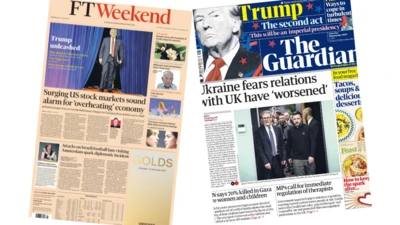We've updated our Privacy and Cookies Policy
We've made some important changes to our Privacy and Cookies Policy and we want you to know what this means for you and your data.
Trump tax cuts: Here’s why they matter to us all
Image source, Getty Images
- Author, Kamal Ahmed
- Role, Economics editor
It is known as the great synchronisation.
For the first time since the financial crisis all the global centres of economic growth are seeing an economic growth spurt.
Christine Lagarde, the managing director of the International Monetary Fund, was so chipper at the fund's Autumn Meeting in October she took to quoting Percy Shelley.
"There is harmony in autumn," she told the assembled finance ministers in Washington, including Philip Hammond.
Europe, China, Japan, the emerging Asian economies and America (the world's economic growth engine) had all seen an "accelerating cyclical upswing", the IMF said, upgrading its global growth forecast to 3.7% from 3.6%.
Crunch cure?
A figure that is in sharp contrast to last year's more sluggish 3.2%, which was the lowest since the financial crisis.
Finally, the world is dragging itself out of its credit crunch stupor.
The decision by the US Senate to pass Republican proposals for a $1.3trn (£1trn) tax cut is likely to further boost the American economy.
An analysis by the non-partisan Joint Committee on Taxation suggests that over a decade GDP growth could increase by 0.7% compared with a baseline scenario of no change.
And for an economy worth in the region of $19trn that's an awful lot of new value.
As I am sure President Donald Trump will be, well, trumpeting.
Money returns
Corporation tax on business profits will be cut from 35% to 21%.
Alongside new restrictions on shifting profits abroad, the cut is likely to lead to a major repatriation of US business profits which are at present being sheltered offshore.
Individual taxes will also be cut, but more modestly.
"In general, tax policy affects economic growth by changing incentives for owners of capital to invest and for potential workers to supply labour to the economy by changing the after-tax rates of return to these two factors of production," the Joint Committee said in its analysis earlier this month.
Put simply, tax cuts tend to be an economic incentive to invest for businesses and to work and spend for employees.
Drawbacks
Of course, there have been many critics of the US tax reforms.
The wealthy gain more than those less well off.
And the business tax cuts are far larger than those for middle-income Americans.
The cuts are also likely to add to the US deficit, although Republicans argue that greater economic growth will ultimately increase the overall tax take.
There is one big take out from today's policy change - American economic growth is strengthening and this is likely to boost it further.
China, much of the rest of Asia and the European continent are also seeing stronger figures.
That is good news for Britain, where, although overall growth has been downgraded, exports have been boosted, helped along by the weaker pound.
Manufacturing output surveys suggest order books are at their healthiest for 30 years.
The great synchronisation is with us.
And America's plans for tax cuts won't do anything to harm that.
Top Stories
More to explore
Most read
Content is not available








